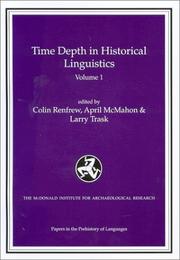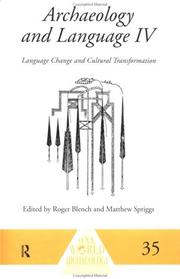| Listing 1 - 7 of 7 |
Sort by
|
Book
ISBN: 1282444840 9786612444845 9027288712 9789027288714 9789027232694 9027232695 Year: 2009 Publisher: Philadelphia, PA : John Benjamins Pub. Company,
Abstract | Keywords | Export | Availability | Bookmark
 Loading...
Loading...Choose an application
- Reference Manager
- EndNote
- RefWorks (Direct export to RefWorks)
A growing scala of computational and robotic experiments are trying to pin down the cognitive and social prerequisites that may have given rise to human language. From humble beginnings showing how a lexicon may self-organize in a population of artificial agents, these research efforts are now exploring how grammatical languages about complex scenes may emerge. This paper introduces this field of inquiry and then explores whether a dialog with archeologists might be useful.
Anthropological linguistics. --- Linguistic paleontology. --- Language and languages --- Origin of languages --- Speech --- Paleontology (Linguistics) --- Anthropological linguistics --- Reconstruction (Linguistics) --- Anthropo-linguistics --- Ethnolinguistics --- Language and ethnicity --- Linguistic anthropology --- Linguistics and anthropology --- Anthropology --- Language and culture --- Linguistics --- Origin. --- Origin --- Etymology --- Linguistic paleontology
Book
ISBN: 9789027204561 9789027274953 902720456X 9027274959 1280497645 9786613592873 9781280497643 6613592870 Year: 2012 Publisher: Amsterdam ; Philadelphia : John Benjamins Pub. Co.,
Abstract | Keywords | Export | Availability | Bookmark
 Loading...
Loading...Choose an application
- Reference Manager
- EndNote
- RefWorks (Direct export to RefWorks)
The fascinating question of the origins and evolution of language has been drawing a lot of attention recently, not only from linguists, but also from anthropologists, evolutionary biologists, and brain scientists. This groundbreaking book explores the cultural side of language evolution. It proposes a new overarching framework based on linguistic selection and self-organization and explores it in depth through sophisticated computer simulations and robotic experiments. Each case study investigates how a particular type of language system can emerge in a population of language game playing age
Ethnology. Cultural anthropology --- Sociolinguistics --- Anthropological linguistics. --- Linguistic paleontology. --- Language and languages --- Ethnolinguistique --- Paléontologie linguistique --- Langage et langues --- Origin. --- Origines --- Language and languages -- Origin. --- Language and languages - Origin. --- Anthropological linguistics --- Linguistic paleontology --- Languages & Literatures --- Philology & Linguistics --- Origin --- Paléontologie linguistique --- Paleontology (Linguistics) --- Anthropo-linguistics --- Ethnolinguistics --- Language and ethnicity --- Linguistic anthropology --- Linguistics and anthropology --- Origin of languages --- Speech --- Reconstruction (Linguistics) --- Anthropology --- Language and culture --- Linguistics --- Etymology

ISBN: 1902937066 1902937147 1902937139 9781902937069 Year: 2000 Publisher: Cambridge: University of Cambridge. McDonald institute for archaeological research,
Abstract | Keywords | Export | Availability | Bookmark
 Loading...
Loading...Choose an application
- Reference Manager
- EndNote
- RefWorks (Direct export to RefWorks)
Historical linguistics --- Glottochronology --- Linguistic paleontology --- Space and time in language --- Language and languages --- Paleontology (Linguistics) --- Anthropological linguistics --- Reconstruction (Linguistics) --- Comparative linguistics --- Lexicology --- Linguistic change --- Mathematical linguistics --- Etymology --- Historical linguistics - Congresses. --- Glottochronology - Congresses. --- Linguistic paleontology - Congresses. --- Space and time in language - Congresses.
Book
ISBN: 0520045939 Year: 1982 Publisher: Berkeley : University of California Press,
Abstract | Keywords | Export | Availability | Bookmark
 Loading...
Loading...Choose an application
- Reference Manager
- EndNote
- RefWorks (Direct export to RefWorks)
African languages --- Linguistic paleontology --- Prehistoric peoples --- Homme préhistorique --- History --- Congresses --- Congrès --- Africa --- Afrique --- Antiquities --- Antiquités --- Congresses. --- Homme préhistorique --- Congrès --- Antiquités --- Cavemen (Prehistoric peoples) --- Early man --- Man, Prehistoric --- Prehistoric archaeology --- Prehistoric human beings --- Prehistoric humans --- Prehistory --- Human beings --- Antiquities, Prehistoric --- Paleontology (Linguistics) --- Anthropological linguistics --- Language and languages --- Reconstruction (Linguistics) --- History&delete& --- Etymology --- Eastern Hemisphere --- Primitive societies
Book
ISBN: 1316375471 1316371476 1107634792 1316377474 1316378470 1316376478 1316374475 1107444977 1107059372 1316373479 1316365476 Year: 2015 Publisher: Cambridge : Cambridge University Press,
Abstract | Keywords | Export | Availability | Bookmark
 Loading...
Loading...Choose an application
- Reference Manager
- EndNote
- RefWorks (Direct export to RefWorks)
In this book, Lynne Kelly explores the role of formal knowledge systems in small-scale oral cultures in both historic and archaeological contexts. In the first part, she examines knowledge systems within historically recorded oral cultures, showing how the link between power and the control of knowledge is established. Analyzing the material mnemonic devices used by documented oral cultures, she demonstrates how early societies maintained a vast corpus of pragmatic information concerning animal behavior, plant properties, navigation, astronomy, genealogies, laws and trade agreements, among other matters. In the second part Kelly turns to the archaeological record of three sites, Chaco Canyon, Poverty Point and Stonehenge, offering new insights into the purpose of the monuments and associated decorated objects. This book demonstrates how an understanding of rational intellect, pragmatic knowledge and mnemonic technologies in prehistoric societies offers a new tool for analysis of monumental structures built by non-literate cultures.
Linguistic paleontology. --- Anthropological linguistics. --- Prehistoric peoples. --- Oral tradition. --- Tradition, Oral --- Oral communication --- Folklore --- Oral history --- Cavemen (Prehistoric peoples) --- Early man --- Man, Prehistoric --- Prehistoric archaeology --- Prehistoric human beings --- Prehistoric humans --- Prehistory --- Human beings --- Antiquities, Prehistoric --- Anthropo-linguistics --- Ethnolinguistics --- Language and ethnicity --- Linguistic anthropology --- Linguistics and anthropology --- Anthropology --- Language and culture --- Linguistics --- Paleontology (Linguistics) --- Anthropological linguistics --- Language and languages --- Reconstruction (Linguistics) --- Etymology --- Primitive societies

ISBN: 0415117615 0415117607 0415100542 0415518709 0203202902 1282903241 1134855850 Year: 1997 Volume: 27, 29, 34 Publisher: London ; New York : Routledge,
Abstract | Keywords | Export | Availability | Bookmark
 Loading...
Loading...Choose an application
- Reference Manager
- EndNote
- RefWorks (Direct export to RefWorks)
Archaeology and Language III interprets results from archaeological data in terms of language distribution and change, providing the tools for a radical rewriting of the conventional discourse of prehistory.
Historical linguistics. --- Linguistic paleontology --- Archaeology. --- Oral tradition. --- Prehistoric peoples. --- Linguistique historique --- Paléontologie linguistique --- Archéologie --- Tradition orale --- Homme préhistorique --- Linguistic paleontology. --- Cavemen (Prehistoric peoples) --- Early man --- Man, Prehistoric --- Prehistoric archaeology --- Prehistoric human beings --- Prehistoric humans --- Prehistory --- Human beings --- Antiquities, Prehistoric --- Tradition, Oral --- Oral communication --- Folklore --- Oral history --- Archeology --- Anthropology --- Auxiliary sciences of history --- History --- Antiquities --- Paleontology (Linguistics) --- Anthropological linguistics --- Language and languages --- Reconstruction (Linguistics) --- Diachronic linguistics --- Dynamic linguistics --- Evolutionary linguistics --- Language and history --- Linguistics --- Etymology --- Europe --- Languages --- Primitive societies
Book
ISBN: 1316485161 1316471446 1316482154 1107135133 1316501078 Year: 2016 Publisher: Cambridge, England : Cambridge University Press,
Abstract | Keywords | Export | Availability | Bookmark
 Loading...
Loading...Choose an application
- Reference Manager
- EndNote
- RefWorks (Direct export to RefWorks)
How can we unravel the evolution of language, given that there is no direct evidence about it? Rudolf Botha addresses this intriguing question in his fascinating new book. Inferences can be drawn about language evolution from a range of other phenomena, serving as windows into this prehistoric process. These include shell-beads, fossil skulls and ancestral brains, modern pidgin and creole languages, homesign systems and emergent sign languages, modern motherese, language use of modern hunter-gatherers, first language acquisition, similarities between language and music, and comparative animal behaviour. The first systematic analysis of the Windows Approach, it will be of interest to students and researchers in many disciplines, including anthropology, archaeology, linguistics, palaeontology and primatology, as well as anyone interested in how language evolved.
Language and languages --- Human evolution --- Linguistic paleontology --- Anthropological linguistics --- Historical linguistics --- Philology & Linguistics --- Languages & Literatures --- Diachronic linguistics --- Dynamic linguistics --- Evolutionary linguistics --- Language and history --- Linguistics --- Anthropo-linguistics --- Ethnolinguistics --- Language and ethnicity --- Linguistic anthropology --- Linguistics and anthropology --- Anthropology --- Language and culture --- Paleontology (Linguistics) --- Reconstruction (Linguistics) --- Evolution (Biology) --- Physical anthropology --- Evolutionary psychology --- Human beings --- Origin of languages --- Speech --- Origin --- Social life and customs --- History --- Etymology --- Anthropological linguistics. --- Historical linguistics. --- Origin. --- Social life and customs.
| Listing 1 - 7 of 7 |
Sort by
|

 Search
Search Feedback
Feedback About UniCat
About UniCat  Help
Help News
News